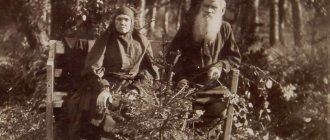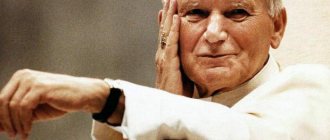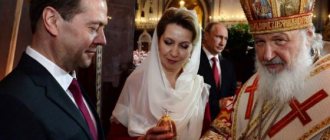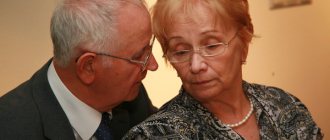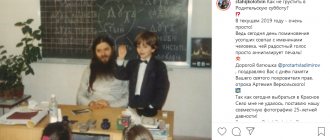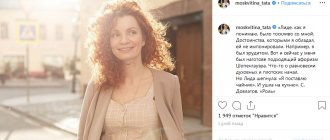Early life and studies
During his school years, he, like all students, was offered to join the Komsomol. But Alexey was one of the few who flatly refused the offer. He did not talk about the reasons for this decision, but perhaps it is related to faith.
After 3 years, namely in 1955, Osipov graduated from high school, but refused to enroll in a university, despite the persuasion of his parents. The reason for the refusal was again faith. Instead of higher education, he deepened theology for several years under the guidance of the clergyman Abbot Nikon. In 1958, he received a letter of recommendation from his mentor, thanks to which he was able to enter the fourth grade of the Moscow Theological Seminary the first time.
Osipov Alexey Ilyich
Just 1 year later he was already studying at the Moscow Theological Academy. He defended his dissertation in the Department of Ancient Greek. He graduated from the educational institution, receiving a candidate of theology degree. Upon graduation, he was issued a certificate directing him to work in the Smolensk diocese.
https://youtu.be/https://youtu.be/Rr6dSXIbR8k
_
Growing in Faith
Having met Abbot Nikon in early childhood, Alexey Ilyich was imbued with the spirit of Orthodox piety, became accustomed to a contemplative life and grew up under the sensitive guidance of his mentor. The elder immediately drew attention to the inquisitive and diligent boy and taught him a lot. He gave Alyosha Russian classics, Greek philosophers and, of course, the holy fathers of the Orthodox Church to read - John Climacus and the collection “Philokalia”.
The elder also monitored the boy’s studies, his grades and his leisure time. He taught him, for example, how to play chess, but then, when Alexey Ilyich had already grown up, he forbade him from playing chess, saying that it was a pointless waste of time. To the young man’s perplexed questions, the elder answered that in adolescence, chess is a lesser evil compared to other nonsense that can swarm in a teenager’s head.
Career
Despite the opportunities, he accepted an invitation to graduate school at the Moscow Theological Academy. After graduating, he stayed there to teach in the new discipline of “Ecumenism” for that time. Two years later he was offered to teach classes in Basic Theology, and then the same subject at the seminary.
Ecumenism (universe, inhabited world) is the ideology of pan-Christian unity, the desire for the unity of religious communities throughout the Universe.
As a graduate student, Alexey Ilyich gave lectures on Contemporary theological problems, History of Russian religious and philosophical thought, and Protestantism. At the academy, in addition to his main subject, he also taught Western Confessions.
As a graduate student, Alexey Ilyich lectured on Contemporary Theological Problems
He climbed the career ladder slowly but surely. In 1969, he became an associate professor at the same academy, 6 years later a professor, and 9 years later a doctor of theology.
Many people are interested in why Alexey Ivanovich, having gone through a rather long path of education and eventually receiving a candidate of theology degree upon graduation, did not become a priest, because in theory everything was going exactly towards this. In fact, at some point he simply realized that his true direction was not priesthood, but pedagogy.
In his opinion, to be ordained at the academy is a very strange act. A priest must have a flock. In an academy, its head is the rector, and the priest’s job is only to serve. They can conduct teaching activities, but only in the rank.
Life outside the academy
Outside of academic life, Alexey Osipov also achieved a lot. For example, in 1964 he was appointed secretary of the commission of the Russian Orthodox Church for the preparation of materials for the religious and ethnic encyclopedia of Athens. From 1967 to 1987, and later 1995-2005. — as part of the board of the almanac “Bogoslav’s Works”. Around the same period (1973-1986) he was a member of the educational committee at the Holy Synod. Also for a long time (1976-2004) he served on the commission of the Holy Synod.
For about 22 years, Osipov worked as the head of the postgraduate branch of the Moscow Theological Academy under the department of external church relations. He was editor-in-chief of the journal “Theological Bulletin” and co-chairman of the annual international conference “Science. Philosophy. Religion".
Since 2009, he has been a member of the presidium of the Inter-Council Presence and its church commission.
For a year he worked simultaneously on the publishing council of the Moscow Patriarchate, the joint coordinating committee for interaction between the Russian Orthodox Church and the Armed Forces of the Russian Federation. Later he was a member of the permanent Presidium of the I-IV World Russian Councils.
Since 2009, he has been a member of the presidium of the Inter-Council Presence and its church commission.
Participated in bilateral dialogues held by the Russian Orthodox Church with the Vatican, Pre-Chalcedonian churches, Lutheran churches of the GDR, the National Council of Churches of the USA, etc.
Participated in various assemblies, for example, in the World Council of Churches, the Christian Peace Conference, many international, regional and other events both at home and abroad.
He has performed on radio broadcasts, television programs, in high schools, institutes, universities, cultural centers, parish churches and conferences (Russia, Ukraine, Belarus, Turkey, Poland, India, etc.).
Excerpts from his books were published in “Theological Works”, “Journal of the Moscow Patriarchate”, newspapers, and also abroad.
In 2014, information appeared in many newspapers, magazines, and on the Internet that Alexey Ilyich Osipov left the Moscow Theological Academy due to reaching the age of 75. But on the official website of the academy he is still listed as an employee.
Alexey Ilyich Osipov received many awards
For his active work, Osipov was awarded many awards, for example: the Order of St. Macarius, Metropolitan of Moscow and All Rus', III degree, the Order of the Holy Blessed Equal-to-the-Apostles Prince Vladimir, III degree, etc.
link > Recently, the attacks to which the professor of the Moscow Theological Academy Alexey Ilyich Osipov has become increasingly noticeable. In this article we will reflect a little on what kind of forces and for what reasons are they trying to persecute Alexei Ilyich?
Those who closely follow the activities of Professor A.I. Osipov, listen to his lectures, understand perfectly well that the main difference between Alexei Ilyich and all other media representatives of the Russian Orthodox Church is that he talks about the main thing - about correct spiritual life. He speaks in an accessible, understandable manner and, most importantly, not from himself, but exclusively from the patristic works. And in this regard, Alexei Ilyich’s lectures are the connecting link that brings people to the Holy Fathers. Therefore, it is still easier for us to listen to a lecture than to read the Holy Fathers, especially at the beginning, when many questions are not clear and we need to acquire a preliminary understanding of what is being discussed. By reading the Holy Fathers, a person gains knowledge of what spiritual life is, how to lead it, and can subsequently, having begun to live this way, come to Christ through experience.
I think this is precisely the reason for the criticism. Think about why popular priests who never leave TV screens talk about anything, forgetting to talk about correct spiritual life, attention to oneself, correct prayer and the need to read the Holy Fathers. Above, we called Alexei Ilyich a media person, but this is not entirely true, because he is not shown anywhere except on Orthodox TV channels. Once, in 2012, they were invited to the “Culture” TV channel, where A. I. Osipov spoke on the “Academia” program with a lecture “The Origin of Man.” There, Professor Osipov answered a student’s question about the theory of evolution, saying that it has no scientific evidence. After all, there is no transitional link between man and monkey, there are no similar links between animals, there is no law according to which a living thing could come from a non-living thing, other arguments were given.
And what happened then? Panic arose; home-grown paleontologists, unable to refute any of the arguments presented by Alexei Ilyich, began to indiscriminately and groundlessly accuse him of ignorance.
There are priests and other church leaders who are trying to prevent people from coming to the Holy Fathers, through lectures by A.I. Osipov. and therefore, counting on the gullibility of people, they slander Alexei Ilyich, accusing him, if not of all mortal sins, then certainly of most of them.
From all the criticism, three main points can be distinguished; the professor is accused of allegedly:
1. Prohibits the baptism of infants;
2. Perverts the teaching of the Church, saying that Gehenna (hellish torment) will be limited in time;
3. Forbids monks to confess to the abbots of monasteries.
All of the above arguments are untrue, and here's why.
Infant Baptism
Alexey Ilyich is not talking at all about the ban on baptizing infants, he is talking about something else, that the sacraments must be treated correctly, and not as magic.
The same applies to the Eucharist (Holy Communion). About the limitations of Gehenna.
On this issue, the opinions of the Holy Fathers are divided, some say that the hyena will be eternal, others that the hyena will be limited. Many Holy Fathers write about the limitations of Gehenna, because God is love, and how can one understand then that he created people, knowing that they would be doomed to eternal torment. Alexey Ilyich speaks referring to them.
That is, Alexey Ilyich says that there are two opinions on this issue, so why criticize him? Or now, if Gehenna is truly limited, then there is no need to be saved, well, just think, “I’ll burn in hell” for a thousand years, what’s so bad? It seems that no one can seriously say this, because even in this short earthly life, there are no people who want to suffer, to endure some kind of terrible torment, without consolation.
About spiritual mentors, obedience. What are we talking about here? The fact that today there are no God-inspired mentors (that is, those who have achieved dispassion). The 19th century saint St. wrote about this. Ignatiy Brianchaninov:
Ignatiy Brianchaninov about mentors
“Saint Gregory of Sinai, a 14th-century writer, decided to say that in his time there were no men of grace at all, they had become so rare; Sinait points out the reason for this in the extraordinary development of vices that resulted from increased temptations. (Good Chapter 118, part 1). Moreover, in our time, the practitioner of prayer needs to observe the greatest caution. We don’t have God-inspired mentors!”
Therefore, for our time, residence by advice is offered. The spiritual mentor gives advice from the Holy Fathers, and the one in leadership checks it with the Holy Fathers, and then makes a decision: to accept this advice or not.
And Alexey Ilyich says that rank, in itself, does not at all give holiness, and if a person holds the position of abbot of a monastery (abbot), this does not at all mean that he has achieved holiness. And therefore, the obedience that was accepted between the novice and the elder earlier in the Church is impossible today, since there are no people who have achieved dispassion. But there is no talk at all about a ban on confession to the abbots of monasteries. The point is that our Church does not fall apart into hundreds of totalitarian sects.
And today there are a lot of false spiritualists, and this is what St. wrote about this. Ignatius:
“Soul-destructive acting and the saddest comedy - elders who take on the appearance of ancient elders, but do not have their spiritual gifts.”
It turns out that Alexei Ilyich is not invited to television channels, like other church figures, precisely because he always talks about the main thing - about the foundations of spiritual life.
Who benefits from this? Those forces that do not want our people to turn to Christ, those forces that want to seduce our people and direct them along the wrong path. These forces, to a greater extent political, their task is to replace the correct faith with “Orthodox paganism” and worship of the Tsar - the Anointed of God, they need this in order to deceive us and use the Russian people to implement the idea of building a theocratic Empire in Russia.
Childhood
Alexey Osipov was born on March 31, 1938 in the city of Belev, Tula region.
Origin and birth
About A.I.’s relatives Osipov and about the earliest years of his life there is very little information. It is known that he was born into a family of Soviet employees, his father was a military man, his mother worked in a store. Having changed several cities, in 1952 the Osipovs settled in the city of Gzhatsk (now the city of Gagarin) in the Smolensk region.
Family
About his childhood A.I. Osipov says very little and reluctantly, repeating every time he is asked about it that public confession was abolished back in the 1st century AD. It was then that it was decided that a person should confess one-on-one with a priest, so he would have nothing to tell about his past to a wider audience.
Biography of Alexey Ilyich Osipov. Personal life, wife
Alexey Ilyich was born on March 31, 1938 in the ancient Russian town of Belevo, which is located in the Tula region. But he spent his childhood and youth in the city of Kozelsk and the village of Optino, next to the famous Optina Monastery, an Orthodox monastery, which was inactive at that time.
The biography of Alexei Ilyich Osipov and his personal life were determined by his acquaintance with Abbot Nikon. This meeting took place in early childhood and influenced the boy’s entire future life and fate. He grew in a clear understanding of his path and tried in everything to be like his teacher and confessor Father Nikon.
Pious life, asceticism and prayer practice filled the life and biography of Alexei Ilyich Osipov. Wife and family were excluded in such an almost monastic environment. Alexey Ilyich is not married, leads a modest life and works for the good of the Church of Christ.
Teenage years and early life
After graduating from high school, Alexei Osipov was faced with the question of further education. The management of the school where he studied suggested that he enter some institute, but his mentor, Abbot Nikon, advised Alexei to choose a different path.
Study of Theology
Over the next 3 years, Alexey Osipov, under the guidance of his spiritual mentor, prepared to enter the Moscow Theological Seminary. The emphasis was on studying the lives of the holy fathers and their interpretation of the foundations of the Christian faith.
In 1958, having received a written recommendation from Abbot Nikon, Alexey Osipov was enrolled in the 4th (graduating) class of the theological seminary, which he successfully graduated from in 1959. As Alexey Ilyich later recalled, even the seminary teachers did not give such deep knowledge in theology and the study of the works of the holy fathers that the Mentor gave him to their students.
Next, Osipov entered the Moscow Theological Academy, graduated from which in 1963, received a candidate of theology degree and was sent to work in one of the churches in the city of Smolensk (the topic of the dissertation is “Translation of the rites of Matins and Vespers according to the 1951 edition of the service book of the Greek Church in comparison with Russian service book of the synodal publication"). Osipov did not work in his new position for long. At the invitation of a higher educational institution of the Russian Orthodox Church, he enters graduate school.
Alexey's mentor - Abbot Nikon
Hegumen Nikon (Nikolai Vorobyov) is a priest and spiritual writer. A well-known ascetic in Orthodox circles, he leads an exceptionally pure, ascetic life, filled with prayer and love for the people around him. The future elder Nikon went through the crucible of revolution, civil strife and war. He also experienced a loss of faith and a passion for science and philosophy.
After spending years, he realized that the sciences do not study the human soul, do not deal with issues of death and sin, but, on the contrary, have only superficial knowledge about the most important, from his point of view, issues. Then he delved into the study of Orthodoxy and reached the depths of understanding the evidence of the Epiphany and the importance of the spiritual path. He followed this path of faith all his life. At the age of 36, Nicholas became a monk. In those years, the monasteries were closed, and therefore he had to lead the difficult life of a monk in the world. So he labored until his death in 1963. In his life there were camps, and exile, and many other sorrows and misfortunes, but he did not become embittered, but remained a bright man, devoted to God and the Faith of Christ.
After himself, Abbot Nikon left many religious and apologetic articles, as well as a large number of letters in which his opponents were ordinary people who sought advice and prayers from the elder.
Mature age
At the age of 26, in 1964, Alexei Osipov completed his graduate studies, having attended a course at the Theological Academy.
Teaching at the Academy
Immediately after completing his postgraduate studies, Osipov was appointed there as a teacher of basic theology and the new discipline of Ecumenism for that time (pan-Christian cohesion, the desire for the unity of all religious communities in the Universe). While working in his new position, Alexey Ilyich simultaneously lectures at the theological academy in the first year and at the seminary in the fifth year on the fundamentals of the Christian faith, theology and Western religions.
Since 1969 Osipov has been an associate professor, and since 1975 a professor at the Theological Academy. Since 1990, for three years, he was the editor-in-chief of the Theological Academy publication “Theological Bulletin”.
Work in the Russian Orthodox Church
In 1964, Osipov was appointed secretary of the commission of the Russian Orthodox Church (ROC) for the preparation of materials for a religious and ethical encyclopedia, the publication of which was planned to be carried out in Athens.
From 1973 to the present, Professor Osipov has been actively involved in the activities of the Russian Orthodox Church:
- was a member of the educational committee of the Theological Academy under the Holy Synod (the governing body of the Russian Orthodox Church) until 1986;
- was a member of the Holy Synod Commission on Christian Unity until 2004;
- in 1988 he was a member of the Anniversary Local Council of the Russian Orthodox Church
- from 1994-1995 was a member of the coordinating committee for interaction between the Armed Forces of the Russian Federation and the Russian Orthodox Church
- from 1995-1997 — member of the permanent Presidium of the World Russian Councils of the II-IV convocations;
- was a member of the Church and public group for the preparation of the celebration of the 2000th anniversary of the Nativity of Christ;
- was a member of the Synodal working group to develop the fundamentals of the concept of the Russian Orthodox Church;
- since 2009 - member of the presidium of the Inter-Council Presence and its commission on church education.
- took part in bilateral dialogues of the Russian Orthodox Church with other religious denominations.
It should be noted that today the attitude of the Russian Orthodox Church to the lectures and worldview of Professor A.I. Osipov is ambiguous. On the one hand, in the field of Basic Theology (apologetics), he is undoubtedly the largest specialist; as for Dogmatic Theology (sections of the doctrine of salvation, the final destinies of the world and man), here, according to the conclusion of the Synodal Biblical Theological Commission (2016 g.), the professor’s lectures do not correspond to Orthodox dogma, based on Divine revelation.
This video presents an excerpt from a lecture by Professor A.I. Osipov "About ten righteous people".
Social and political activities
Professor A.I. Osipov actively participates in public and political life:
- from 1996 to 1987 and from 1995 to 2005. was a member of the editorial board of the collection “Theological Works”;
- from 1991 to 2021 — was the co-chairman (from religion) of the annual international conference “Science. Philosophy. Religion";
- was a participant in the assemblies of the World Council of Churches;
- participated in the conference of European churches;
- took part in the Christian Peace Conference;
- was invited to many world-wide international and other church and public conferences and assemblies in Russia and abroad.
Participation in television programs
Alexey Ilyich Osipov speaks a lot:
- at meetings with students of theological academies;
- with believers;
- on TV.
Professors are often invited to give lectures, and they always ask a lot of questions. His performances can often be seen on the Orthodox channel “Soyuz”.
Viewers are extremely concerned not only with questions of faith, but also with the personal life and marital status of the professor, whether he has children, whether he is married or not. However, Osipov never talks about himself personally. He believes that his biography and personal life are not a reason for discussion.
It is much more important to talk about what he sees as his purpose:
- Bring to those present the messages of the holy fathers.
- Discuss issues of Orthodoxy and Christianity.
Lecture activities
In his lectures, Alexey Ilyich talks about Orthodoxy, spiritual life, and the legacy of the holy fathers. The professor’s erudition not only in theological issues, but also in matters of philosophy, psychology and culture attracts the attention of more and more listeners. Alexey Ilyich always finds the right words, speaks in simple language about complex issues of Existence, motivates for further knowledge and growth in faith, and pays great attention to raising children.
The biography of Alexei Ilyich Osipov is itself an example of correct church life, an example of piety and humility. Through the life of this amazing and modest man, Orthodoxy appears before us in all its historical significance, in its spiritual greatness, in its beauty and splendor. The truth of Orthodoxy, as Professor Osipov says in his lectures, is easily proven; you just need to approach this issue with an open mind and an open heart.
Alexey Ilyich also does not hide important negative issues - the problems of the church, his own mistakes, the ugly actions of clergy and church clergy. He tells his listeners about all this and openly shares his thoughts about church life.
Lectures and sermons by Alexey Osipov
Theologian Osipov Alexey Ilyich actively gives reports and lectures on radio and television, writes and publishes books, audio and video discs with recordings of his lectures. He is actively invited to meetings in various audiences.
Speeches by A.I. Osipova are distinguished by their excellent language, understandable to everyone present, without any unctuousness. Every time after meeting with him, viewers and listeners ask the professor questions and receive comprehensive answers to them, so each lecture by Osipov is an interesting discussion about various aspects of Orthodoxy, as well as about different aspects of the spiritual life of a person and society.
Listen to A.I. Osipov can be found on his personal website on the Internet, where all recordings of speeches and interviews of recent years are collected, as well as new lectures by Professor Osipov.
The topics that are touched upon in the conversations are very broad: from questions about Christianity, what Christianity is, what it gives to a person, to answers to everyday questions that concern every person: how to get rid of grief, depression, despondency, about the principles of Orthodox upbringing of children, about the basics morality, marriage, love.
Books by A.I. have been published. Osipov, containing his main thoughts and theses:
- "God";
- “From time to eternity: the afterlife of the soul”;
- “The Path of Reason in Search of Truth”;
- "Love, marriage and family";
- "Become a saint";
- “Hegumen Nikon (Vorobiev). Letters on spiritual life";
- "Spirit Bearers"
Professor Osipov has a lot of friends and supporters, but he also has critics and ill-wishers. Alexey Ilyich has repeatedly said in interviews that he is ready for a constructive dialogue with any opponents, as long as the accusations are supported by any evidence. Osipov advises everyone to have their own opinion on matters of faith; for this he recommends studying the lives and revelations of the holy fathers, to the study of whose works he devoted his entire life.
Spiritual life
Spiritual life in the biography of Alexei Ilyich Osipov is a fundamental concept. It, as the holy fathers of the Church taught, is the only correct life. The only true and most difficult path. Father Nikon told young Alexei Ilyich that spiritual life is the greatest rarity among people in our time. People are accustomed to confusing a highly moral life and a spiritual life. Many people are deceived in this and follow the wrong path. Spiritual life, or the path of the ascetic, is a constant remembrance of death, clear awareness, purity of every second moral choice and majestic calm.
Modern people are immersed in an anti-spiritual atmosphere of vanity. Vanity takes over all the free time of such people and does not give them the slightest chance to stop and comprehend what is happening to them. First of all, to understand ourselves, our lives and the meaning of these lives. And if a person does not think about the meaning of life, gives it up to vanity, then his existence becomes meaningless, says Alexey Ilyich Osipov. This is repeatedly confirmed in the biographies of many church devotees. Whatever a person is in life, if he has a need to understand his existence, then his life is gradually transformed, structured, and he gradually begins to move along the religious path.
Alexey Ilyich talks a lot about the patristic heritage, the apostolic ministry and the holy martyrs of the twentieth century. His balanced attitude, deep faith and brilliant wit create an atmosphere of intelligence and trust during his lectures. But the professor pays attention not only to the holy fathers; he cites many examples of piety from the lives of ordinary people, ordinary husbands and wives. In the biography of Alexei Ilyich Osipov, there are also such people - pure, generous Christians, whose acquaintance transforms and beautifies the world.
Another problem of our time, according to Alexei Ilyich, is entertainment. Endless temptations and pleasures, like vanity, distract people from the main issues of existence. All these are attributes of a completely anti-Christian world, in which there is no place for repentance and prayer. A person has no time to stop, think, raise his head and peer into the sky. Comprehend Eternity.
OSIPOV ALEXEY ILYICH
Born on March 31, 1938 in the city of Belev, Tula Region, into a Russian family of employees.
Until 1952, he lived first in the city of Kozelsk, Kaluga region, then in the village of Optino, Kozelsky district. Since 1952 he lived in the city of Gzhatsk (now Gagarin) in the Smolensk region.
After graduating from high school in 1955, refusing offers from the school management to enter any institute, for three years at home he studied the principles of theology under the guidance of Abbot Nikon (Vorobyov) (+1963). In 1958, having received a written recommendation from him (with the blessing of Archbishop Mikhail (Chub) of Smolensk and Dorogobuzh), he was accepted into the fourth (graduation) class of the Moscow Theological Seminary, having passed exams for the three previous classes.
The following year he entered the Moscow Theological Academy, from which he graduated in 1963 with a candidate of theology degree, having defended a dissertation in the department of ancient Greek on the topic: “Translation of the rites of Matins and Vespers according to the 1951 edition of the service book of the Greek Church in comparison with the Russian service book of the Synodal edition.”
After graduating from the academy, he received a certificate of assignment to the Smolensk diocese. But in the fall of the same year, I received an invitation to the newly opened graduate school at the Moscow Theological Academy. Upon completion, he remained there as a teacher in the then completely new discipline “Ecumenism”.
In 1964, he was appointed secretary of the commission of the Russian Orthodox Church for the preparation of materials for the Religious and Ethical Encyclopedia, published in Athens.
In 1965, he was invited to lecture on Basic Theology at the academy, and then the following year to lecture on the same subject at the seminary.
In subsequent years, in graduate school, he lectured on the History of Russian religious and philosophical thought, Protestantism, and modern theological problems; in the academy, in addition to Basic Theology - according to Western confessions.
From 1967 to 1987 and from September 1995 to 2005, he was a member of the editorial board of the collection “Theological Works.”
In 1969 he received the title of associate professor.
From 1973 to 1986 - member of the Educational Committee at the Holy Synod from the Moscow Theological Academy.
In 1975 he was confirmed with the rank of professor.
From 1976 to 2004 - member of the Holy Synod Commission on Christian Unity, which was transformed in 1994 into the Synodal Theological Commission.
Since 1979, he was a member of the Inter-Orthodox Preparatory Theological Commission for the preparation of Orthodox-Lutheran dialogue, and from 1982 to 2007 - of the Mixed Orthodox-Lutheran Theological Commission for dialogue; from 1991 to 1998 - member of the “Faith and Church Order” commission of the World Council of Churches.
From 1981 to 2004 - head of the postgraduate branch of the Moscow Theological Academy at the DECR.
Criticism
Opponents of Prof. Osipov found in his statements views that, in their opinion, seriously contradicted church teaching; the degree of criticism sometimes reached the point of accusations of heresy. In 2013, a letter was sent to the Patriarch of Moscow and All Rus' Kirill from a group of believers (48 signatures) headed by the head of the Orthodox Missionary School at the Synodal Missionary Department A. V. Lyulka [1], in which the authors asked for clarification regarding whether they correspond whether the opinions of A.I. Osipov's "accurate exposition of the Orthodox faith." The professor's wrongness was expressed by the authors of the letter in the following five points:
- Denial by Osipov A.I. eternity (infinity) of Gehenna torment.
- In some lectures Osipov A.I. directly states that Christ accepted original sin, teaches that the Lord accepted and healed the original sinfulness “in Himself” through gradual correction.
- Osipov A.I. declares the dogma of the Atonement to be borrowed from Roman Catholicism, allegedly alien to Orthodox dogma and the teaching of the fathers.
- Speaking about the Sacrament of the Eucharist, Professor Osipov A.I. teaches that in the Sacrament it is not the true transubstantiation of bread and wine into the Body and Blood of the Savior, but the “hypostasis” (“in Chalcedonian”) of bread and wine into the Hypostasis of God the Word, that is, believers partake not of the true Body and Blood, but of the bread itself and wine.
- Denial of the need for infant baptism, denial in general of the need for the Sacrament of Baptism for salvation.
In 2021, the authors of the letter received the Conclusion of the Synodal Biblical-Theological Commission signed by its secretary A. A. Shishkov [2] on all five points, the essence of which boils down to the following:
- The opinion about the finality of hellish torment and the theological views associated with it have no basis in the Holy Scriptures
- The New Testament repeatedly emphasizes the complete non-involvement of the incarnate Son of God with any sin.
- Orthodox theology, without accepting the extremes of the legal theory of the Atonement, has always recognized the dogma of the Atonement as one of the fundamental foundations of the Christian doctrine of salvation.
- Not a single Local Church, not a single Church Council, has rejected the term “transubstantiation” or condemned it as unorthodox. As for the theory of Professor A.I. Osipov, it is a theological innovation based on the views of Archpriest Sergius Bulgakov.
- The practice of infant baptism is mentioned in early Christian sources. There is no clear answer in the Orthodox tradition to the question about the final fate of unbaptized infants.
The letter concluded as follows:
Alexey Ilyich did not agree with the “Conclusion”; in his response, he pointed out that his statements were partly distorted by the accusers, or taken out of context, and expressed regret that the Commission did not take into account his arguments and the patristic sayings he cited. With the answer of Professor A.I. Osipov to the “Conclusion” and the reaction of his opponents to this answer can be found on the page “Correspondence polemics regarding the conclusion of the SBBC on the theological views of Prof. Osipov" online resource "ABC of Faith" - https://azbyka.ru/otechnik/Patrologija/zaochnaja-polemika-po. va/
Awards
- Order of St. book Vladimir III Art. (1971);
- Order of Venerable Sergius III Art. (1979);
- Order of St. Prince Vladimir II Art. (February 1988, in connection with the 50th anniversary of his birth);
- order of honor book Daniel of Moscow III Art. (March 1998, in connection with the 60th anniversary of his birth);
- order of saints Macarius, Metropolitan of Moscow, II Art. (April 2013, in recognition of active educational activities, for diligent missionary work and in connection with the 75th anniversary of his birth) [3].
Proceedings, publications
Published in the “Journal of the Moscow Patriarchate” (JMP), in “Theological Works”, “Stimme der Ortodoxie” (publishing house of the Moscow Patriarchate), in secular magazines and newspapers, as well as abroad: in Germany, Finland, Greece, the USA, Italy and other countries.
- Translation of the rites of Matins and Vespers according to the 1951 edition of the service book of the Greek Church in comparison with the Russian service book of the Synodal edition. (Manuscript. MPDA Library.)
- Basic theology. A course of lectures for students of the Moscow Theological Seminary. Moscow.1994.
- The path of reason in search of truth. M. “Danilovsky evangelist”. 1997; "Brotherhood in the name of St. Alexander Nevsky. 1999; M. "Sretensky monastery". 2002, 2003, 2004; M. "Good." 2003; St. Petersburg "Satis." 2007.
- Orthodox understanding of the meaning of life. Kyiv. 2001.
- The afterlife of the soul. "Danilovsky evangelist". 2005; 4th ed.: M. 2007.
- Hegumen Nikon (Vorobiev). Letters on spiritual life. Sretensky monastery. 2005.
- Afterlife. M. "Gift". M. 2006.
- Bearers of the spirit of St. Ignatius (Brianchaninov). M. 2007.
From published articles, reports:
- Justice and violence. Theological works. No. 11.M. 1973.
- Violence and justice. ZhMP.1973. No. 5.
- Salvation is liberation for peace and justice in Christ. The meaning of the Church. ZhMP.1976.No.3.
- On some principles of the Orthodox understanding of ecumenism. Theological works. No. 18. M. 1978.
- Thirtieth anniversary of the World Council of Churches. JMP. 1978. No. 12. - 1979. No. 1.
Sources:
https://zakulisi.ru/biografii/biografiya-osipova-alekseya-ilyacha/ https://proreligiu.club/lichnosty/deyateli/osipov-aleksej-ilich.html https://drevo-info.ru/articles/4427 .html
